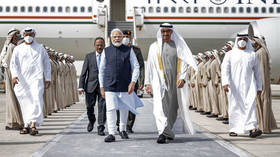India to help African nations develop digital payment systems, Mint reports
Namibia, Mozambique and Kenya among countries where New Delhi is reportedly expanding its Unified Payment Interface (UPI) network
India is in talks with a number of African countries, including Namibia, Mozambique and Kenya, to help them develop their own instant payment systems similar to that of its UPI system (Unified Payment Interface), daily newspaper Mint reported on Sunday, citing sources.
“There are many countries in the world which have similar problems we had before the advent of UPI. These are financial inclusion, supporting rural economies, fintech incubation, transparency and other things,” Ritesh Shukla, CEO of the system’s developer National Payments Corporation of India (NPCI), told Mint earlier in August. “We are looking at partnering with those countries to help them create their own versions of UPI in a very sovereign manner,” he said.
Shukla also noted that the number of countries where UPI will be deployed will double in the next 18 months. At present the global UPI footprint incorporates neighbors Nepal, Bhutan and Sri Lanka, and extends to Oman, Singapore, the United Arab Emirates, Saudi Arabia, France and Australia.
India has also recently signed memorandums of understanding with Antigua and Barbuda, Armenia, Sierra Leone and Suriname on sharing its Digital Payments Index in line with the Reserve Bank of India’s (RBI) guidelines.
Meanwhile, talks are ongoing between New Delhi and Moscow to mutually accept each other’s payment cards, India’s RuPay and Russia’s MIR, in their respective markets, and to integrate their instant payment systems.
The NPCI’s expanded network of commercial partnerships seeks to help Indian travelers to make payments using digital platforms, in a bid to save both time and cost overruns. India is also looking to tap its 30-million-strong diaspora across the world and to standardize their user experience in sending money, or remittance, back to India.
The democratization of digital public infrastructure, which uses a virtual payment address, is likely to further strengthen India’s booming remittance economy. It became the first country in the world whose annual remittances crossed the $100-billion mark in 2022, with a year-on-year growth of 12%, according to the World Bank’s data.
According to the Central Bank of India, about 73% of all non-cash transactions in the country last year were via UPI, and this figure is projected to reach 90% by 2026-27, according to a PWC report. During the last financial year, the volume of UPI transactions increased by 80% from 46 billion to 83 billion, with the average value of transactions also rising.
Currently, the system facilitates over nine billion consumer transactions monthly worth around 14.3 trillion rupee ($173 billion), according to NPCI data. By 2026-27, PWC estimates the number of transactions will reach a billion per day.
You can share this story on social media:








Comments are closed.